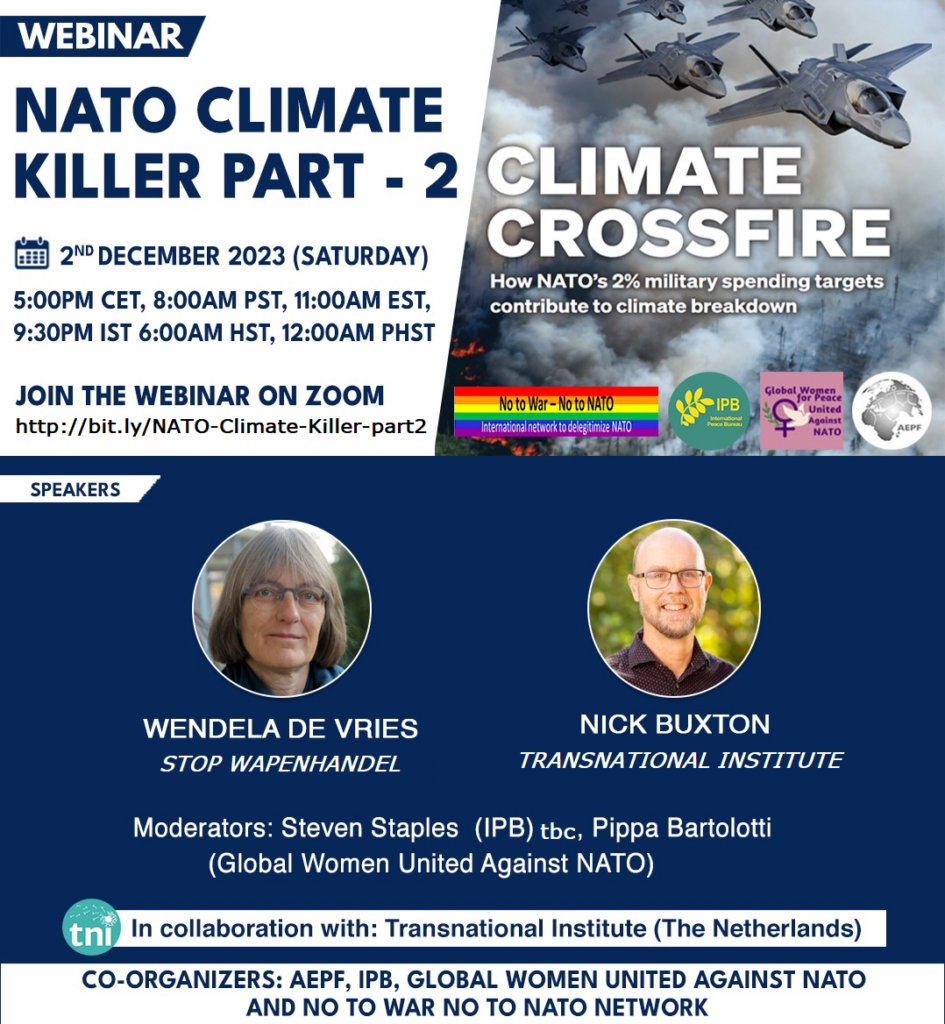2023/12/02
video is online now
Webinar NATO is a Climate Killer Part 2
Follow-up Webinar
CLIMATE CROSSFIRE:
How NATO’s 2% military spending targets contribute to climate breakdown
Should the world’s richest countries spend on wars or on preserving the planet? New research reveals that NATO’s aim to spend 2% of GDP on the military will accelerate climate breakdown, potentially endangering our planet.
The climate is caught in the crossfire of war. To safeguard our world, peaceful conflict resolutions are essential. A secure nation cannot exist on an unsafe planet. At COP28 this December, political leaders face a critical choice: Do they favor a heavily armed yet deteriorating world, or a healthy planet where peaceful coexistence thrives?
Join us for a compelling discussion on the insights from the new report, ‘Climate Crossfire – How NATO’s 2% spending targets worsen the climate crisis.’ This discussion sheds light on the perilous implications of increased military spending during COP28
Invited Speakers:
Nick Buxton is knowledge hub coordinator for TNI, an international research and advocacy institute committed to building a just, democratic and sustainable planet. At TNI, Nick focuses on issues such as digitalisation, border politics, climate change, militarism and economic justice. He was co-editor of the book, The Secure and the Dispossessed – How the military and corporations are seeking to shape a climate-changed world, published in 2015 which first started to look at the intersection of climate and militarism. Since then, he has co-authored many reports on militarism and climate change including A primer on climate security – the dangers of militarising the climate crisis, Climate Collateral – how military spending accelerates climate breakdown, and the most recent report, Climate Crossfire – How NATO’s 2% spending targets contribute to climate breakdown.
Wendela de Vries is researcher/activist at Stop Wapenhandel, an independent peace organisation in the Netherlands of which she is also co-founder. She is member of the Steering Commitee of the European Network Against Arms Trade and coordinates the international working group on Arms, Militarisation and Climate Crisis. De Vries studied International Relations at the University of Amsterdam. Research interests include EU military industry and Relation between climate crisis and militarisation. Contributions to publications and books including “Locked-in Emissions: The Climate Change Arms Trade” (Cairo Review of Global Affairs 2021) “Climate Collateral, How military spending accelerates climate breakdown” (TNI, Stop Wapenhandel and TPNS 2022) and “Arms trade; lost opportunity for climate solutions” published as part of debate #2 of the SALAM project, Fall 2023.
Organizers are:











